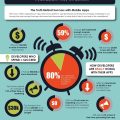10 Of The Best Leadership Books You Can Read
Leaders are born not made… We think that’s complete bs… Leadership can be learned and leaders can be made. It’s a skill that most people can improve and develop. How to do that! We’ve got it for you. Here are some of the best leadership books out there that you can start with. They contain diverse and precious knowledge on the matter anyone can take advantage of…
OK, let’s kick back and explore some of the best leadership books of all time. Whether you’re an aspiring leader or a seasoned executive, these books offer timeless wisdom and practical advice to help you lead effectively. So, grab your favorite beverage, relax, and let’s dive into these must-reads.
1. “Leaders Eat Last” by Simon Sinek
Overview: Simon Sinek explores why some teams pull together and others don’t. He delves into the concept of “circle of safety” and how leaders can create environments where people feel secure, fostering collaboration and innovation.
Why It’s a Must-Read: This book highlights the importance of empathy and putting the needs of your team first. It’s packed with stories and examples that illustrate how great leaders build trust and cooperation.
Key Takeaways:
- The significance of a leader’s ability to foster a sense of safety.
- How biology and anthropology explain leadership and team dynamics.
Sources: Simon Sinek, Forbes
2. “The Five Dysfunctions of a Team” by Patrick Lencioni
Overview: This book presents a fable about a struggling team, then breaks down the five dysfunctions that are often at the root of team problems: absence of trust, fear of conflict, lack of commitment, avoidance of accountability, and inattention to results.
Why It’s a Must-Read: Lencioni provides a clear model and actionable steps for overcoming common team dysfunctions, making it a practical guide for leaders looking to build stronger, more cohesive teams.
Key Takeaways:
- Trust is the foundation of a functional team.
- Healthy conflict is essential for growth and innovation.
Sources: Patrick Lencioni, Harvard Business Review
3. “Drive: The Surprising Truth About What Motivates Us” by Daniel H. Pink
Overview: Daniel Pink challenges traditional notions of motivation, arguing that autonomy, mastery, and purpose are the true drivers of motivation. He supports his claims with research from psychology and economics.
Why It’s a Must-Read: This book provides insights into what truly motivates people, offering valuable lessons for leaders on how to inspire and engage their teams.
Key Takeaways:
- The inadequacy of traditional carrot-and-stick motivation.
- The importance of fostering an environment that supports autonomy and mastery.
Sources: Daniel Pink, The Guardian
4. “Good to Great” by Jim Collins
Overview: Jim Collins and his team researched thousands of companies to identify what makes good companies great. The book outlines key principles such as Level 5 Leadership and the Hedgehog Concept.
Why It’s a Must-Read: It provides a research-based framework for transforming a good company into a great one, with practical advice applicable to leaders at all levels.
Key Takeaways:
- The characteristics of Level 5 Leaders.
- The importance of disciplined thought and action.
Sources: Jim Collins, Inc.
5. “The 7 Habits of Highly Effective People” by Stephen R. Covey
Overview: Stephen Covey’s classic offers a principle-centered approach for solving personal and professional problems. It outlines seven habits that can help individuals achieve effectiveness.
Why It’s a Must-Read: The principles are universal and timeless, providing a solid foundation for personal and professional growth.
Key Takeaways:
- Be proactive and take responsibility for your actions.
- Begin with the end in mind by setting clear goals.
Sources: FranklinCovey, The 7 Habits
6. “The Art of War” by Sun Tzu
Overview: This ancient Chinese military treatise offers strategies and tactics for warfare, many of which are applicable to leadership and management. It emphasizes strategy, preparation, and adaptability.
Why It’s a Must-Read: Despite being written over 2,500 years ago, its insights into strategy, leadership, and human nature are still relevant today.
Key Takeaways:
- The importance of strategic planning.
- Understanding and leveraging your strengths and weaknesses.
7. “Leadershift” by John C. Maxwell
Overview: John Maxwell discusses the importance of leaders being adaptable and open to change. He introduces eleven shifts that leaders need to make to stay relevant and effective.
Why It’s a Must-Read: The book provides practical advice on how to navigate the changing landscape of leadership and remain effective.
Key Takeaways:
- The necessity of continuous learning and growth.
- Adapting leadership styles to meet evolving challenges.
Sources: John Maxwell, Success
8. “Emotional Intelligence” by Daniel Goleman
Overview: Daniel Goleman explores the concept of emotional intelligence (EQ) and its critical role in leadership. He argues that EQ is a more significant predictor of success than IQ.
Why It’s a Must-Read: Understanding and improving your emotional intelligence can significantly enhance your leadership capabilities.
Key Takeaways:
- The five components of emotional intelligence: self-awareness, self-regulation, motivation, empathy, and social skills.
- How EQ can improve workplace performance and relationships.
Sources: Daniel Goleman, Harvard Business Review
9. “Start with Why” by Simon Sinek
Overview: Simon Sinek emphasizes the importance of understanding your “why” – your purpose, cause, or belief that inspires you to do what you do. He argues that successful leaders and organizations start with why.
Why It’s a Must-Read: It provides a powerful framework for leadership and organizational success, focusing on the importance of purpose.
Key Takeaways:
- The Golden Circle: Why, How, What.
- People are inspired by leaders who clearly communicate their purpose.
Sources: Start with Why, TED Talks
10. “The One Minute Manager” by Kenneth Blanchard and Spencer Johnson
Overview: This book presents a simple, effective approach to management through three techniques: One Minute Goals, One Minute Praisings, and One Minute Reprimands.
Why It’s a Must-Read: Its straightforward, practical advice makes it a great resource for both new and experienced managers.
Key Takeaways:
- Clear communication of goals and expectations.
- The importance of immediate and specific feedback.
Sources: The One Minute Manager, Investopedia
Wrapping It Up
These books collectively offer a wealth of knowledge on leadership, from building trust and fostering collaboration to understanding emotional intelligence and maintaining motivation. Whether you’re looking to improve your leadership skills or seeking new strategies to lead your team, these books provide timeless insights and practical advice. So, pick one up, get comfortable, and start your journey towards becoming a better leader!








